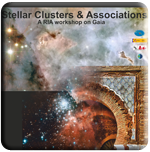The spatial distribution of stars in open clusters
Sánchez, N., Alfaro, E.J.
The Astrophysical Journal, Volume 696, Issue 2, pp. 2086-2093 (2009).
05/2009
ABSTRACT
The analysis of the distribution of stars in open clusters may yield important information on the star formation process and early dynamical evolution of stellar clusters. Here we address this issue by systematically characterizing the internal spatial structure of 16 open clusters in the Milky Way spanning a wide range of ages. Cluster stars have been selected from a membership probability analysis based on a nonparametric method that uses both positions and proper motions and does not make any a priori assumption on the underlying distributions. The internal structure is then characterized by means of the minimum spanning tree method (Q parameter), King profile fitting, and the correlation dimension (Dc ) for those clusters with fractal patterns. On average, clusters with fractal-like structure are younger than those exhibiting radial star density profiles and an apparent trend between Q and age is observed in agreement with previous ideas about the dynamical evolution of the internal spatial structure of stellar clusters. However, some new results are obtained from a more detailed analysis: (1) a clear correlation between Q and the concentration parameter of the King model for those cluster with radial density profiles, (2) the presence of spatial substructure in clusters as old as ~100 Myr, and (3) a significant correlation between fractal dimension and age for those clusters with internal substructure. Moreover, the lowest fractal dimensions seem to be considerably smaller than the average value measured in galactic molecular cloud complexes.


